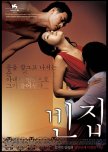
The Spy Who Loved Me
10 oamenii au considerat această recenzie utilă
I wanted this drama to be exceptionally good
I really did. All the three leads were played by the actors whose previous works I liked very much. So when I saw the Cast and the synopsis before starting the drama, I was all hyped up. And to be fair, it started reasonably well. The first 2/3 episode were interesting. but then it all well down the hill. Instead of taking que from some exceptionally well made Korean thriller, the writer/s went along the common troupe road and made a very interesting premise into an average predictable ..... well DRAMA.Damn, I really wanted this one to turn out well.
Considerați utilă această recenzie?

Această recenzie poate conține spoilere
Avoid at all cost
I think I could have just end my review at that. There is actually nothing worth mentioning in this drama except Kim Seon Ho's acting. Only his character seems remotely interesting.The name and summary of the drama is a click bait (Is that can even be used for a drama?) You expect it to delve into the business/tech world of IT but all we get is some pussy character more interested in getting the girl/boy rather than actually working towards their dream. I was actually hoping to see them crash and burn but this drama even deprived me from that pleasure and success just magically fell into their lap. What a load of crap!!!!!
Considerați utilă această recenzie?

Această recenzie poate conține spoilere
A Must Watch Kim Ki-duk Masterpiece
I don't often refer to a film as "haunting," because I think it's an overused term. To me, a haunting film is one that relentlessly stays with the viewer for hours, or even days, after a viewing. Its memory refuses to diminish and it demands rumination. A good movie isn't always haunting, and a haunting one isn't always good, but there often is a correlation.Such is the case with 3-Iron, from acclaimed director Kim Ki-duk (who sadly recently passed away). This enigmatic and in some ways maddening motion picture has the power to haunt every viewer it reaches. This film is very much in line with the director’s previous films, being a complex exploration of human relationships and communication, as well as the violence so often inherent in these aspects of our existence.
One of the most striking aspects of “3-Iron” is the way Kim generates tension between the calm, ambient existence of the two protagonists (Tae-suk (Jae Hee) and Sun-hwa (Lee Seung-yeon)) and the violent noise of the outside world. This tension is laid bare by the fact that neither of the protagonists utters a word until the final scenes of the film. By eliminating dialogue, Kim forces his characters to interact on a non-verbal level, and it intensifies the manifestations of their emotions. The whole film is filled with small gestures, and a gentle form of communication which is innovative and at times simply delightful. Both actors give outstanding performances, and the range of emotions they convey with mere looks and actions is quite incredible.
This silence, combined with the gentle soundtrack and Kim’s dreamy, gorgeous visuals, gives the parts of the film which focus on the strange couple a haunting and beautiful air which is joyful in its innocence, yet sad because the viewers are all too aware that their self-imposed isolation will not endure. Kim constantly reminds viewers of this by shooting the outside world in harsh colors and shadowy darkness, portraying a world filled with selfish, vicious characters.
In the end, Kim offers some form of hope, though typically, this is left very much up to the viewer to interpret and to draw meaning from, as the film’s final act takes a decidedly surrealist turn, with events that may or may not be real, and a climax which is incredibly moving, whilst leaving much to the imagination.
This, for many viewers, will be the main problem with the director’s films, as his decision not to impose any kind of real moral judgment on his characters, or to offer any concrete answers to the questions raised, can be frustrating. However, for those who enjoy films which stimulate and probe, Ki-duk Kim’s works can almost be seen as philosophical tracts which beg for deeper meditation in a way which is hugely rewarding in an age where most films simply spoon feed viewers their plots and secrets.
Considerați utilă această recenzie?
























